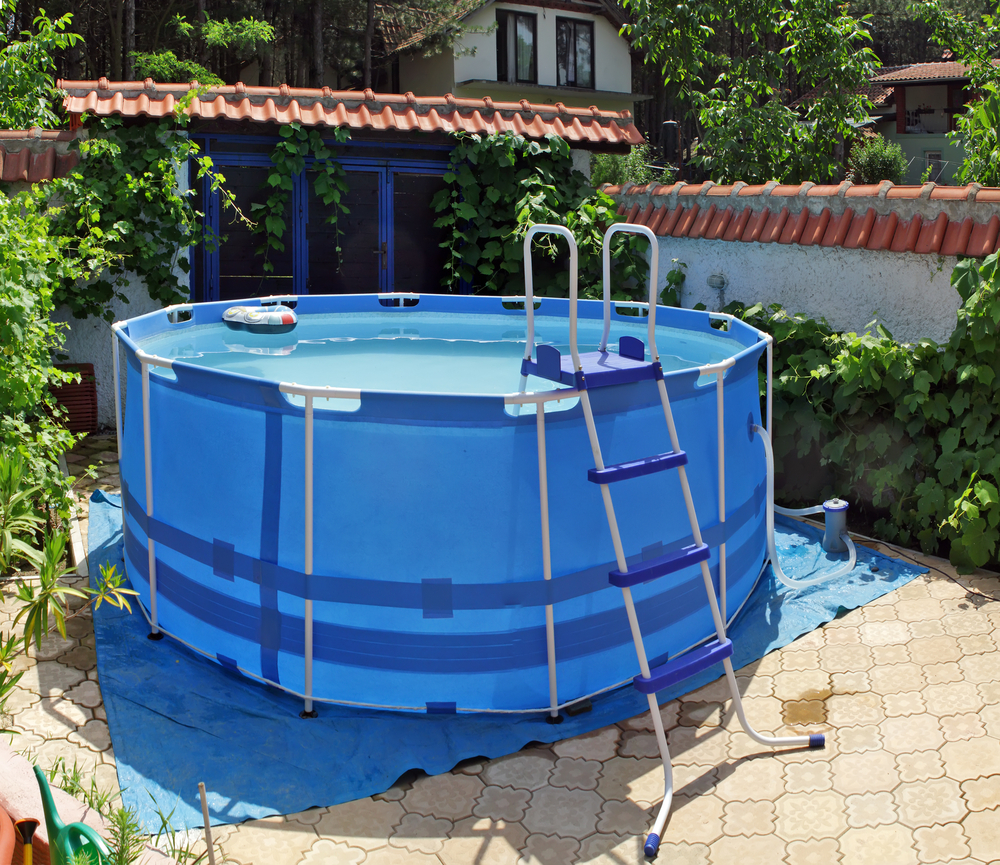Have you ever considered getting an inflatable pool for your backyard? They’re a popular option for those who want to enjoy some summer fun without the commitment and cost of a traditional pool. But are inflatable pools really worth it? In this article, we’ll discuss the pros and cons of inflatable pools compared to traditional pools, so you can make an informed decision. Whether you’re looking for a temporary solution or something more long-term, we’ll cover all the important factors to consider.
When it comes to convenience, inflatable pools definitely have the upper hand. They’re easy to set up and take down, meaning you can have your pool ready for some splashy fun in no time. Plus, they’re portable, so you can move them around your yard or even take them on vacation. On the other hand, traditional pools require a significant investment in terms of time, money, and maintenance. From excavation and construction to regular cleaning and upkeep, they require a lot of effort. However, traditional pools offer a permanent fixture that can add value to your property and be enjoyed for years to come. So, whether you prioritize convenience or long-term investment, there are pros and cons to consider with both options.
In the full article, we’ll dive deeper into the pros and cons of inflatable pools compared to traditional pools. We’ll discuss factors like cost, durability, maintenance, and safety, so you can weigh all the options and make the best decision for your needs. Whether you’re a weekend pool warrior or just looking for a place to cool off during those hot summer months, this article will provide you with all the information you need. So stay tuned to learn more about the world of inflatable pools and how they stack up against their traditional counterparts!
Inflatable Pools vs. Traditional Pools: Pros and Cons
When it comes to enjoying the refreshing and fun experience of swimming during the hot summer months, having a pool is a dream come true. However, if you’re considering investing in a pool, you may be wondering whether an inflatable pool or a traditional pool is the right choice for you. In this article, we will explore the pros and cons of inflatable pools and traditional pools, helping you make an informed decision that suits your needs, preferences, and budget.
Benefits of Inflatable Pools
Convenience of Setup and Storage
One of the major advantages of inflatable pools is their ease of setup and storage. Unlike traditional pools that require expensive and time-consuming construction, inflatable pools can be set up within minutes. All you need is an air pump to inflate the pool, and you’re ready to enjoy a refreshing dip. Additionally, when it comes to storage, inflatable pools offer the flexibility of being deflated and stored away when not in use, saving valuable space in your backyard.
Affordability Compared to Traditional Pools
Another significant benefit of inflatable pools is their affordability. Traditional pools can cost thousands of dollars to install, which includes excavation, construction, and maintenance. On the other hand, inflatable pools are considerably cheaper, making them a more budget-friendly option for those who want to enjoy the benefits of a pool without breaking the bank. With inflatable pools, you can have a cost-effective solution to beat the summer heat and create lasting memories with your family and friends.
Portability for Travel or Moving
If you’re someone who loves to travel or frequently moves residences, an inflatable pool offers the advantage of portability. Traditional pools are permanent fixtures that cannot be easily moved, whereas inflatable pools can be packed up and taken with you wherever you go. Whether you’re going on a vacation or relocating to a new home, you can simply deflate your inflatable pool, pack it up, and set it up again at your destination, allowing you to continue enjoying the poolside experience wherever you are.
Versatility in Size and Shape
Inflatable pools come in a wide range of sizes and shapes, offering versatility to suit different needs and preferences. Whether you’re looking for a small-sized pool for your kids to splash around in, a medium-sized pool for family gatherings, or a large-sized pool for hosting parties, there is an inflatable pool available to cater to your specific requirements. Additionally, inflatable pools also come in various shapes, from traditional rectangular and circular pools to novelty-shaped pools that add a touch of uniqueness to your backyard oasis.
Different Sizes of Inflatable Pools
Small-Sized Pools for Kids
Inflatable pools designed for kids are perfect for providing a safe and enjoyable swimming experience. These pools are typically shallow and come with fun and colorful designs that attract children. They offer a great opportunity for children to cool off and have fun during the summer while being closely supervised by parents or guardians.
Medium-Sized Pools for Families
Medium-sized inflatable pools are ideal for families who want to relax and have fun together. These pools offer enough space for multiple family members to swim, play water games, or simply lounge around. They strike a balance between size and affordability, making them a popular choice among families looking for a cost-effective pool option.
Large-Sized Pools for Parties and Gatherings
If you love entertaining guests or hosting poolside parties, a large-sized inflatable pool is the way to go. These pools provide ample space for both swimming and socializing, allowing you to create a fun and inviting atmosphere for your guests. Whether it’s a birthday party, a barbecue, or a casual get-together, a large-sized inflatable pool can turn any gathering into a memorable event.
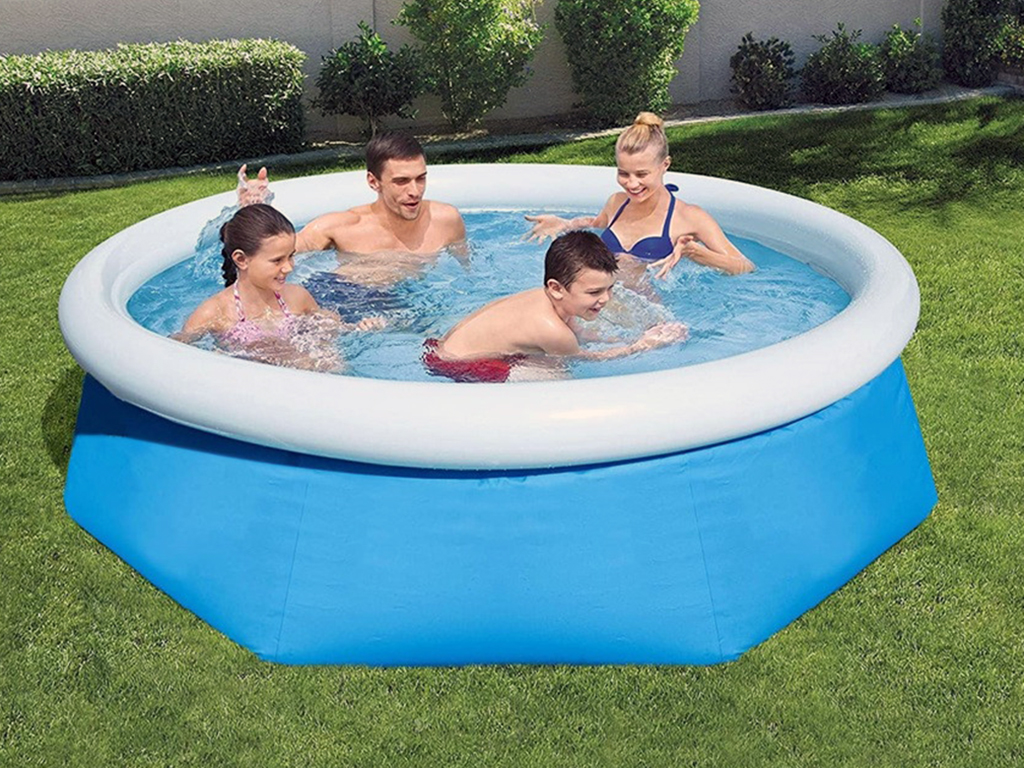
Pricing Options for Inflatable Pools
Budget-Friendly Inflatable Pools
If you’re on a tight budget but still want to enjoy the benefits of a pool, there are plenty of budget-friendly inflatable pool options available. These pools are generally made from durable materials and come with basic features such as inflatable walls and a drain plug. While they may not have the same level of luxury or durability as higher-end options, they still offer a great way to cool off and have fun during the summer months without breaking the bank.
Mid-Range Inflatable Pools
Mid-range inflatable pools offer a good balance between affordability and quality. These pools are often made from sturdier materials, such as reinforced PVC or vinyl, and may include additional features like built-in seating or a filtration system. They are designed to withstand regular use and provide a more comfortable and enjoyable swimming experience compared to budget-friendly options.
High-End Inflatable Pools
For those who prioritize luxury and durability, high-end inflatable pools are the way to go. These pools are made from premium materials and are built to last. They often come with advanced features such as water jets, LED lighting, and even built-in heating systems, allowing you to create a spa-like experience in your backyard. While high-end inflatable pools come with a higher price tag, they offer superior quality and performance that can enhance your swimming experience.
Color Variations in Inflatable Pools
Vibrant and Eye-Catching Colors
Inflatable pools come in a wide range of vibrant and eye-catching colors that add a playful and cheerful touch to your outdoor space. From bright blues and greens to bold yellows and pinks, there are endless color options available to suit your personal style and preferences. Vibrant colors can make your pool visually appealing and create a lively atmosphere for your family and guests.
Neutral and Subtle Tones
If you prefer a more subtle and understated look, there are inflatable pools available in neutral tones as well. These pools often come in shades of white, gray, or beige, blending seamlessly with your existing outdoor decor. Neutral colors can create a tranquil and sophisticated ambiance, allowing you to relax and unwind in a serene pool environment.
Customizable Color Options
Some inflatable pool manufacturers offer customizable color options, allowing you to design a pool that perfectly matches your vision. Whether you want to match your pool to the color scheme of your backyard or create a unique and personalized look, customizable color options give you the freedom to express your creativity and create a pool that truly reflects your style.
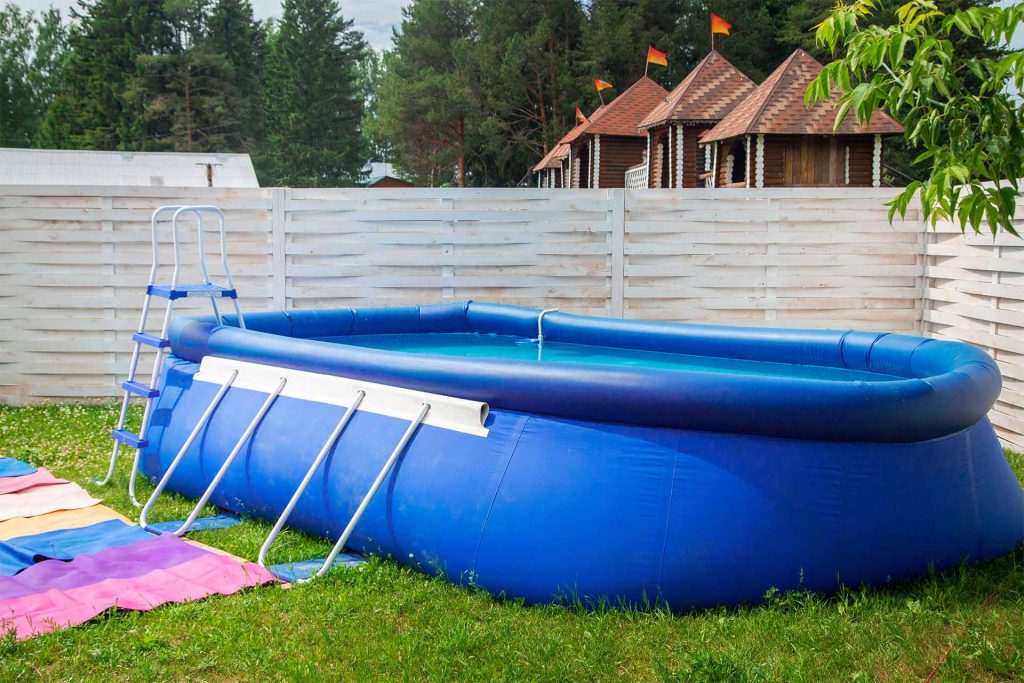
Unique Shapes of Inflatable Pools
Rectangular Inflatable Pools
Rectangular inflatable pools mimic the shape of traditional pools and offer a classic and timeless look. These pools are ideal for swimming laps or engaging in water-based exercises, as their shape provides a straight and uninterrupted swimming path. Rectangular inflatable pools also make efficient use of space, making them a popular choice for smaller backyards or limited outdoor areas.
Circular Inflatable Pools
Circular inflatable pools are a popular choice for their versatility and aesthetic appeal. These pools offer a symmetrical and balanced shape, creating a harmonious focal point in your outdoor space. Circular inflatable pools are great for socializing and lounging, as their rounded shape allows for easy interaction and conversation with multiple people.
Novelty-Shaped Inflatable Pools
For those who want to add a touch of fun and whimsy to their backyard, novelty-shaped inflatable pools are the perfect choice. These pools come in a variety of creative shapes, such as animals, fruits, or even popular cartoon characters. Novelty-shaped inflatable pools are especially popular among children, as they combine the joy of swimming with imaginative play, creating a memorable and unique pool experience.
Maintenance and Care for Inflatable Pools
Cleaning and Sanitizing
Regular cleaning and sanitizing are essential to ensure a safe and hygienic swimming experience in inflatable pools. To clean your pool, start by draining the water and removing any debris. Use a mild detergent and a soft brush or sponge to scrub the walls and floor of the pool. Rinse thoroughly with clean water and allow the pool to dry completely before refilling it. Additionally, regularly test the water chemistry and use appropriate pool chemicals to maintain proper sanitization levels.
Repairing Punctures or Leaks
Despite their durability, inflatable pools can occasionally develop punctures or leaks. If you notice a leak, it’s important to address it promptly to prevent further damage. Begin by locating the source of the leak. Submerge the pool in water and observe where the air bubbles are coming from. Once you’ve identified the leak, dry the area thoroughly and use an appropriate repair kit to patch the hole. Follow the instructions provided with the repair kit carefully, ensuring a secure and long-lasting fix.
Proper Storage Techniques
To prolong the lifespan of your inflatable pool and prevent damage during storage, it’s important to follow proper storage techniques. Start by thoroughly cleaning and drying the pool before deflating it. Remove any excess water and make sure the pool is completely dry to prevent the growth of mold or mildew. Once deflated, fold the pool neatly, removing any air pockets. Store the pool in a cool, dry place away from direct sunlight and extreme temperatures. Avoid placing heavy objects on top of the pool, as this can cause deformation or damage to the material.
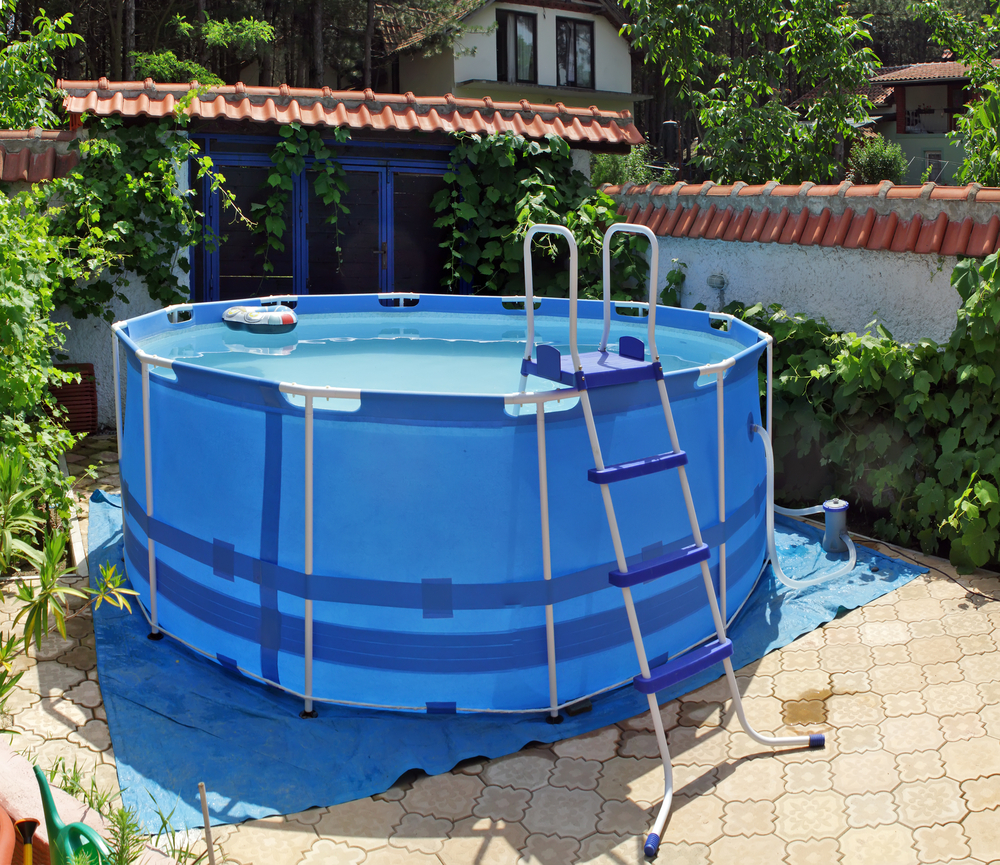
Safety Considerations for Inflatable Pools
Supervision of Children
Safety should always be a top priority when it comes to enjoying any type of pool, including inflatable pools. It is crucial to supervise children at all times when they are in or near the pool, even if they are experienced swimmers. Drowning can occur quickly and silently, so it’s important to maintain constant and vigilant supervision to prevent accidents.
Water Safety Rules and Precautions
Establishing and enforcing water safety rules is essential to minimize the risk of accidents or injuries in inflatable pools. Some important rules to consider include no running or diving in the pool, no pushing or horseplay, and no swimming alone. Additionally, it’s important to teach children basic swimming skills and water safety techniques to improve their confidence and reduce the likelihood of accidents.
Installation of Safety Barriers
Installing safety barriers around your inflatable pool can provide an extra layer of protection, especially if you have young children or pets. Safety barriers can prevent unauthorized access to the pool area, reducing the risk of accidents. Options for safety barriers include fences, gates, or pool covers. Make sure the barriers are secure and meet the necessary safety standards to effectively protect against accidents.
Inflatable Pools for Different Environments
Backyard Inflatable Pools
Backyard inflatable pools are the most common and popular option for homeowners. These pools offer the convenience of being easily accessible and can be enjoyed by the entire family. Backyard inflatable pools are a great way to transform your outdoor space into a personal oasis, providing a retreat from the heat and a place for relaxation and fun.
Roof-Top Inflatable Pools
For those living in urban areas or apartments with limited outdoor space, a roof-top inflatable pool can be a fantastic alternative. Roof-top pools make use of available space on rooftops or balconies, providing a unique and refreshing swimming area. However, it is essential to ensure that the structure can support the weight of the pool and that proper safety measures are in place to prevent accidents or damage.
Indoor Inflatable Pools
Indoor inflatable pools offer the advantage of year-round swimming, regardless of the weather conditions outside. These pools are perfect for those who live in areas with long winters or for individuals who prefer a more controlled environment for swimming. Indoor pools can be set up in a spare room, basement, or garage, allowing you to enjoy the benefits of swimming without being dependent on the outdoor climate.
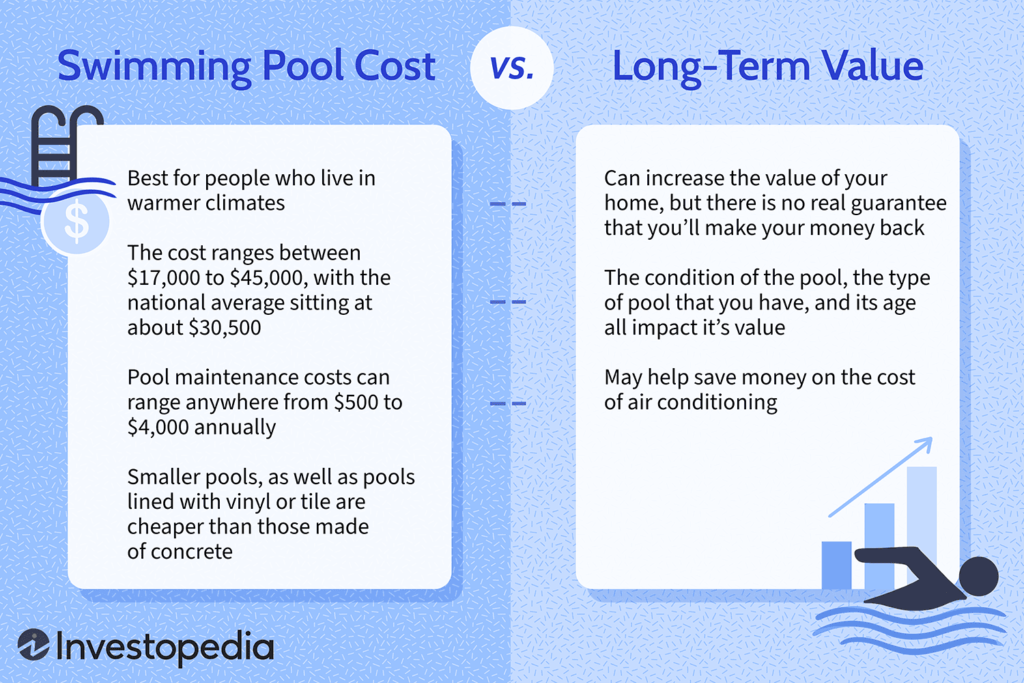
Comparing Inflatable Pools to Traditional Pools
Cost Differences
One of the most significant factors to consider when choosing between an inflatable pool and a traditional pool is the cost. Traditional pools require costly construction, including excavation, plumbing, and electrical installations. The overall cost of a traditional pool can range from several thousand dollars to tens of thousands of dollars, depending on the size and features. In contrast, inflatable pools are much more affordable, with prices starting at a few hundred dollars. The cost savings of inflatable pools make them an attractive option for those on a limited budget.
Installation and Permit Requirements
Installing a traditional pool involves a complex process that requires professional contractors and may require obtaining permits from local authorities. Excavation, plumbing, and electrical work must be done correctly to ensure the pool functions safely and efficiently. Inflatable pools, on the other hand, do not require any construction or specialized installation. You can simply inflate the pool, fill it with water, and start enjoying it immediately. The simplicity of installation makes inflatable pools a convenient and hassle-free option.
Long-Term Durability and Lifespan
When it comes to long-term durability, traditional pools have an advantage over inflatable pools. Traditional pools are built to last for many years, often made from durable materials such as concrete, fiberglass, or vinyl. With proper maintenance and regular care, a traditional pool can last for several decades. Inflatable pools, while durable, have a shorter lifespan. The lifespan of an inflatable pool depends on various factors, such as the quality of the materials and how well it is maintained. On average, an inflatable pool can last anywhere from a few seasons to several years.
Environmental Impact of Inflatable Pools
Water Conservation and Usage
Water conservation is an important consideration when choosing any type of pool. Traditional pools require a significant amount of water to fill and maintain, which can put a strain on local water resources, especially in areas prone to drought or water scarcity. Inflatable pools, on the other hand, typically require much less water due to their smaller size. This can help reduce water consumption and contribute to a more sustainable use of resources.
Material Recycling and Sustainability
As awareness and concern for the environment continue to grow, it’s essential to consider the sustainability of the materials used in inflatable pools. Many manufacturers are now producing inflatable pools using eco-friendly and recyclable materials, such as PVC or vinyl. Using sustainable materials helps reduce the environmental impact of manufacturing and disposal, ensuring that your swimming experience is eco-friendly.
Energy Efficiency Considerations
Energy efficiency is an important factor to consider when choosing a pool, as traditional pools often require energy for heating, filtration, and maintenance. Inflatable pools typically do not require energy-intensive systems, making them more energy-efficient compared to traditional pools. However, it’s essential to note that some high-end inflatable pools may come with additional features such as water jets or heating systems, which can increase energy consumption. Be mindful of the energy requirements of the pool and consider more energy-efficient options if sustainability is a priority.

Health Benefits and Exercise Options with Inflatable Pools
Low-Impact Workouts
Inflatable pools offer a great opportunity for low-impact workouts, making them suitable for individuals with joint issues or those who prefer a gentler form of exercise. The buoyancy of the water reduces the impact on your joints, providing a low-stress environment for performing exercises such as water aerobics, swimming laps, or even yoga. The resistance provided by the water can help build strength and improve cardiovascular fitness.
Hydrotherapy and Relaxation
Inflatable pools can also be used for hydrotherapy and relaxation purposes. The warmth and buoyancy of the water can help relieve muscle tension, reduce stress, and promote overall relaxation. Hydrotherapy involves using water as a therapeutic tool to alleviate various health conditions or simply to enhance well-being. Inflatable pools allow you to create a personal hydrotherapy oasis at home, offering the benefits of hydrotherapy without the need for specialized equipment or expensive spa treatments.
Promoting Active Lifestyles
Having an inflatable pool in your backyard can encourage an active lifestyle within your family. Instead of spending long hours in front of screens, having a pool creates an inviting space for fun and physical activity. Whether it’s playing water games, having swimming races, or simply splashing around, an inflatable pool can motivate both children and adults to get moving and engage in active play.
Choosing the Right Size and Shape for an Inflatable Pool
Factors to Consider
When choosing the right size and shape for an inflatable pool, there are several factors to consider. Firstly, assess the available space in your backyard or the area where you plan to set up the pool. Measure the dimensions accurately to ensure that the pool fits comfortably without overcrowding the space. Additionally, consider the number of people who will be using the pool. If you have a large family or frequently host gatherings, a larger-sized pool might be more suitable. Finally, think about your specific preferences and requirements. If you enjoy swimming laps, a rectangular pool might be the best option, while those who prioritize aesthetics may prefer a circular or novelty-shaped pool.
Determining Space Availability
Before purchasing an inflatable pool, it’s crucial to determine the available space in your desired location. Take accurate measurements of the area, considering both the length and width of the space. Ensure that there is ample room not just for the pool itself but also for any necessary accessories or safety barriers. Remember to factor in clearance space around the pool, allowing for easy access and movement. By determining the space availability beforehand, you can choose a size and shape that fits perfectly into your designated area.
Evaluating User Preferences
Understanding the preferences of the users is essential when choosing the size and shape of an inflatable pool. If you have young children, consider their safety and enjoyment by opting for a small to a medium-sized pool with appropriate water depth. For individuals who prioritize swimming or water-based exercises, a larger-sized rectangular pool might be more suitable. By evaluating the user preferences, you can select a pool that caters to the specific needs and desires of those who will be using it.
Exploring Different Price Ranges for Inflatable Pools
Factors Affecting Price
Several factors can affect the price range of inflatable pools. The primary factor is the size of the pool, with larger-sized pools generally being more expensive than smaller-sized ones. The quality and durability of the materials used in the pool construction also contribute to the price. High-end inflatable pools made from premium materials tend to have a higher price tag compared to budget-friendly options. Additionally, additional features such as built-in seating, water jets, or LED lighting can increase the cost of the pool.
Comparing Price vs. Quality
When considering the price of an inflatable pool, it’s essential to consider the overall quality and durability it offers. While budget-friendly options may save you money upfront, they may not be as long-lasting or resistant to wear and tear. Higher-priced pools often come with better materials, reinforced seams, and additional features that enhance the overall swimming experience. Consider your priorities and budget when selecting a pool, striking a balance between price and quality that aligns with your preferences and needs.
Considering Long-Term Investment
While inflatable pools are generally more affordable than traditional pools, it’s still important to consider them as a long-term investment. Evaluate the expected lifespan of the pool and calculate the cost per use over its lifetime. Consider the potential maintenance or repair costs, as well as the availability of replacement parts or repair kits. By considering the long-term investment, you can ensure that you are making a wise and cost-effective decision when purchasing an inflatable pool.
Conclusion
Inflatable pools and traditional pools each offer unique advantages and considerations. Inflatable pools are convenient, affordable, and versatile, allowing for easy setup, storage, and portability. They come in a wide range of sizes, shapes, and colors, catering to different preferences and needs. Inflatable pools also offer health benefits, low-impact exercise options, and opportunities for relaxation and hydrotherapy. However, traditional pools have the advantage of long-term durability and customization options, albeit at a higher cost and construction complexity.
When deciding between an inflatable pool and a traditional pool, consider your specific needs, preferences, and budget. Evaluate factors such as available space, water conservation, maintenance requirements, and safety considerations. Conduct thorough research, compare prices and quality, and consult with professionals if needed. By considering the pros and cons of inflatable pools and traditional pools, you can make an informed decision that allows you to enjoy the refreshing and invigorating experience of having a pool right in your own backyard.
